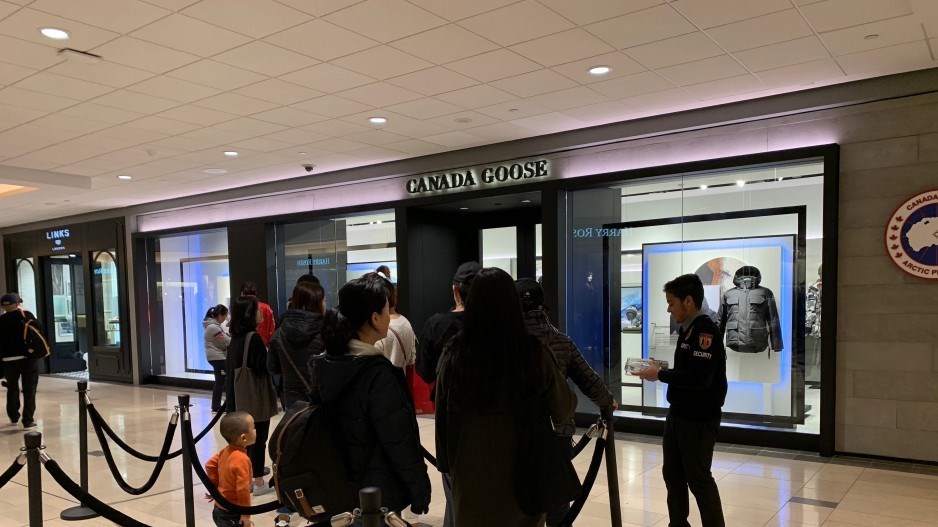Retailers in Vancouver, B.C. and the rest of Canada with significant exposure to Mainland Chinese consumers should expect at least a dip in business in the near future in the wake of the Huawei Technologies Co. Ltd.’s CFO arrest.
That is the view of several industry officials after Chinese officials warned of “grave consequences” if Meng Wanzhou were to be extradited to the United States to face accusations of fraud. Observers have said that Chinese consumers view Huawei as a “national symbol” and have reacted viscerally to news of Meng’s arrest, with one Canadian brand, Canada Goose Holdings Inc.(TSE: GOOS), already targeted in a boycott movement.
In a statement, Tourism Vancouver vice-president of marketing Stephen Pearce said the number of Chinese visitors, who have been a major contributor to the recent success of luxury retailers on Alberni Street and CF Pacific Centre, will likely drop in response to the news about Huawei.
“I would expect to see a short-term decrease in visitor arrivals from China to Canada, particularly those coming for pleasure and/or recreation,” Pearce said. “Generally that sector tends to be more elastic in response to news which is perceived as negative.”
He added, however, that Vancouver does have one mitigating factor for maintaining relatively high visitors numbers, in that it is home to many Chinese students and Canadians with Chinese ties, and the market of those coming to visit family and friends tends to be more resilient than pleasure travellers, Pearce said. Official numbers will not be available until late January.
Metro Vancouver saw a record 10.3 million visitors last year, with China being the second-biggest international market at 300,000. The United States ranked first with 2.4 million visitors.
In an editorial, Chinese media outlet Global Times (owned by People’s Daily, the official newspaper of China’s ruling Communist Party) noted the negative impact Canada will likely see from Meng’s arrest, saying some are questioning the safety of visiting cities like Vancouver. The paper cited South Korea, which saw Chinese tourist numbers plummet by 70% following Seoul’s decision to install U.S. anti-missile defence systems in 2017, as a precedent.
In a separate editorial, Global Times appears to fan the flames on a consumer boycott of Toronto-based parka brand Canada Goose. The company’s stock on the TSX dropped from the December 7 peak price of $84.20 to as low as $73.98 on December 11, although it later rebounded to around $78.
Peking University professor Wang Yong, who had previously been a visiting academic at the University of British Columbia, said the consumer anger in China is very real. Wang added that this is with the background that Beijing itself has not levelled official sanctions on Canadian goods yet, meaning that things could actually get worse if Meng’s case takes a turn that’s deemed unfavourable by the Chinese.
“I’m worried about Canada-China relations,” he said. “The boycott actually started in citizens’ action…. Social Media can be more powerful now in mobilizing the movement. If this case is not properly handled, the impact to this relationship can be very serious.”
Craig Patterson, editor-in-chief of Canadian industry publication Retail Insider, said people don’t have to look far to see an example of how the Chinese market can react ferociously in response to perceived wrongdoing by a retail brand. The most recent case involves Italian luxury fashion house Dolce & Gabbana, which had to cancel a major event in Shanghai in late November after a marketing campaign, featuring a Chinese model trying to eat Italian cuisine using chopsticks, was seen as racist and condescending.
Since the controversy arose, Dolce & Gabbana products have been pulled by most major Chinese e-commerce platforms, and social media was awash with Chinese consumers burning or destroying products from the brand that they already own.
Patterson noted the situation for Canadian brands like Canada Goose is a little different (Dolce & Gabbana’s wounds are self-inflicted) but the results of having significant exposure to the Chinese market, then offending the customers making up that market, are similar, specifically for brands like Canada Goose.
“The demand for Canada Goose in China is quite huge,” Patterson said. “If there really is a boycott, it can really hit the bottom-lines for them, as well as brands like Roots that really play on the Canadian theme…. I don’t think businesses would ever anticipate having an association with Canada being a negative, but if you look at Dolce & Gabbana, I think there may be a follow-through.”
Most Vancouver brands, such as Aritzia, will likely suffer less than Canada Goose because the brands lack Canada in its brand name and have more limited exposure in the Chinese marketplace, Patterson said. But for another Vancouver-based brand, Lululemon Athletica (Nasdaq:LULU.O), which just in August boasted second-quarter profits that almost doubled 2017 levels on the strength of online sales in China, the danger is there if the Meng situation escalates and consumers make the connection of Lululemon to Vancouver and Canada.
“Certainly, it’s a brand that – for people who are loyal – people will recognize as an international brand,” Patterson said. “So the next questions is, do people associate them with Canada? They may very well; I think Chinese consumers will know the company’s background because they will have done their homework.… So if there’s a concerted effort that’s put out there, it probably wouldn’t take much for a boycott to happen. I wouldn’t want to be a Canadian brand or business in China right now.”
He also noted cases like Vancouver design house Jac by Jacqueline Conoir, which found success in China after mixed results locally in Canada. Such companies that are relying on its Chinese business to anchor their re-expansion back home may face difficulties if Chinese consumers become more agitated with Canada and its brands.




